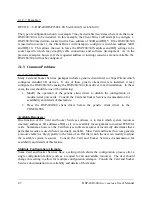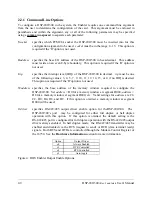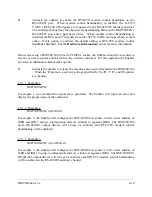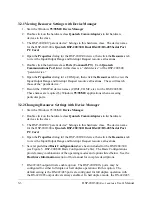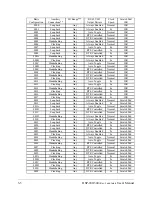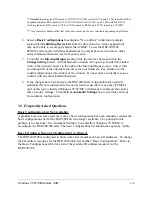
removed and/ or inserted from the system as desired. On each insertion into the
PCMCIA socket, the DSP-200/300 will be automatically reconfigured according to
the command line options.
2.1.2 Command Line Options
The DSP-200/300 Client Driver accepts up to eight command line arguments from the user to
determine the configuration of theDSP-200/300. If any arguments are provided, the Client
Driver will attempt to configure any DSP-200/300s with the options specified in the order they
are entered on the command line. Each argument must be enclosed in parenthesis and must be
separated from other arguments by a
space
on the command line. Within each argument, any or
all of the following parameters may be specified using a
comma (no spaces)
to separate each
parameter:
B
address
specifies a the base I/O address of the DSP-200/300in hexadecimal. This address
must reside on an even 8-byte boundary. If this option is omitted, a base address will
be assigned by Card and Socket Services.
I
irq
specifies the interrupt level (IRQ) of the DSP-200/300in decimal.
irq
must be one of
the following values: 3, 4, 5, 7, 9, 10, 11, 12, 14, 15, or 0 if no IRQ is desired. If this
option is omitted, an interrupt level will be assigned by Card and Socket Services.
S
socket
specifies which PCMCIA socket the DSP-200/300must be inserted into for this
configuration argument to be used.
socket
must be in the range 0 - 15. If this option
is omitted, the configuration argument will apply to DSP-200/300s inserted into any
socket.
Odriver
specifies RS-422/485 output driver enable option for the DSP-200/300 port. The
DSP-200/300’s port may be configured for either full duplex or half duplex
operation with this option. If this option is omitted, the default setting is the
RS-422/485 port is configured for full duplex operation with the RS-422/485 output
drivers always enabled. In half duplex mode, the RS-422/485 transmitter may be
enabled and disabled via the RTS (request to send) or DTR (data terminal ready)
signals. Both RTS and DTR are controlled through the Modem Control Register of
the 16750. See the
Hardware Information
section for more information.
Auto-Toggle
o3
RTS Controlled
o2
DTR Controlled
o1
Always Enabled
o0
Port Output Driver
Option
Figure 3. DOS Client Output Enable Options.
DOS/Windows 3.x
2-4
Summary of Contents for DSP-200/300
Page 6: ...This page intentionally left blank 2 1 DSP 200 300 Rev I and later User s Manual...
Page 18: ...This page intentionally left blank 3 1 DSP 200 300 Rev I and later User s Manual...
Page 24: ...This page intentionally left blank 4 1 DSP 200 300 Rev I and later User s Manual...
Page 33: ...Windows 2000 4 10...
Page 38: ...This page intentionally left blank 5 1 DSP 200 300 Rev I and later User s Manual...
Page 41: ...3 Follow the steps for the Add Quatech Hardware Wizard Windows NT 5 4...
Page 48: ...This page intentionally left blank 7 1 DSP 200 300 Rev I and later User s Manual...
Page 50: ...This page intentionally left blank 8 1 DSP 200 300 Rev I and later User s Manual...
Page 52: ...DSP 200 300 User s Manual Revision 3 12 March 2004 P N 940 0075 312 Quatech Inc...












